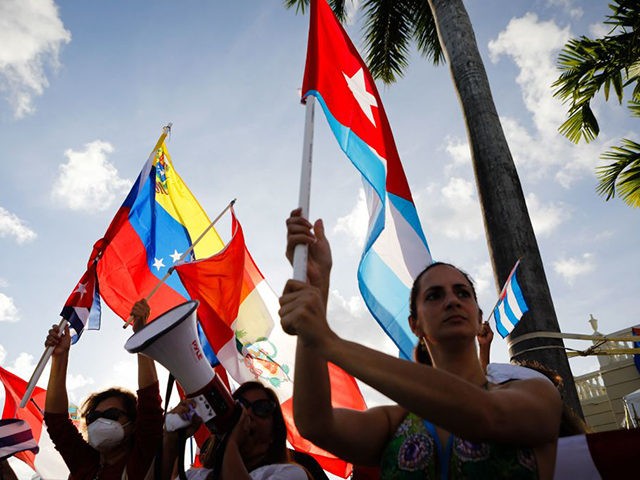Students at the Central University of Venezuela (UCV) in Caracas organized a protest this week, and blocked a major road in the capital, in solidarity with anti-communist protesters in Cuba.
Venezuelan anti-socialist protesters blocked the road and painted the slogan “patria y vida” on it — meaning “fatherland and life,” an anti-communist play on the Castro regime slogan “patria o muerte” (“fatherland or death”). The anti-communist phrase has become the international rallying cry against the 62-year-old Cuban communist dictatorship after the release of a song of the same name by several artists with formerly friendly relations with the Castro regime.
The protesters in Caracas also unveiled a banner reading “our dreams don’t fit in a [prison] cell,” a reference to both anti-socialist protesters in Cuba and Venezuela.
The protest in the Venezuelan capital was a response to thousands of Cubans across the island taking the streets on July 11 to call for an end to the Castro regime.
“This activity is to express solidarity with the people of Cuba and Nicaragua [another communist state] and for the persecution that the countries’ leaders have committed in the past few months,” one of the protesters, who did not identify themselves, reportedly said.
The Cuban protests, the largest on the island in at least two decades, followed a turbulent 2020 in which laws severely limiting the rights of artists prompted hundreds to peacefully surrounded the Ministry of Culture demanding the freedom to paint, write, or film without previously getting a Communist Party permit. The artist protests continued in 2021, prompting the minister of culture himself, Alpidio Alonso, to violently assault a protester on camera in January.
Similarly, the Castro regime has responded to the July 11 protests with disproportionate violence. While evidence suggests the protesters were largely peaceful — and the Castro regime ensures the Cuban people are unarmed — footage from the protests showed police opening fire using live ammunition into crowds of protesters in several major cities. Videos surfacing following the protests also indicated that police were engaging in door-to-door raids, shooting suspected protesters in their own homes and dragging them away from their families.
Reports indicate that protests in Cuba have continued into this week. The Communist Party shut down access to the internet shortly after the July 11 marches began, however, complicating dissidents’ ability to share images of their activities with the world. Mothers of those imprisoned and missing for participating in the first wave of protests organized nationwide marches on Wednesday demanding to know the status of their children, marches that the regime largely repressed by preemptively arresting known dissidents.
The Castro regime in Cuba and that of dictator Nicolás Maduro in Venezuela enjoy extremely close relations. Venezuelan dissidents say their country has been “colonized” by Cuba, using as evidence the Castro regime’s reliance on Venezuelan oil and Maduro’s reliance on Cuban state security agents to repress his people. Experts believe, and defectors have corroborated, that nearly 100,000 Castro regime agents are operating to help keep the Maduro regime in power on the ground in Venezuela. A 2019 report also accused Cuba of using Venezuela as a hub for its terrorist activities, in particular its relationship with the Revolutionary Armed Forces of Colombia (FARC) and other drug trafficking syndicates.
“One [service colonizing Venezuela provides to Cuba] is to outsource to Venezuela an array of criminal activities which happen to coincide with the geopolitical objectives of Cuba’s most obnoxious international allies (Russia, Iran, the FARC, the ELN [National Liberation Army], Hezbollah),” the 2019 report Cubazuela: Chronicle of a Cuban Intervention by the Foundation for Human Rights in Cuba explained. “This can be accomplished by transferring to Caracas the connections with drug trafficking and its logistics, and the training and provisioning connections of terrorist and ‘rogue’ groups like the aforementioned (ETA also made use of those facilities before it disappeared).”
Castro regime agents are believed to have played a major role in the repression and torture of dissidents during the 2014-2016 wave of protests in Venezuela. Interviews with survivors of state torture in Venezuela repeatedly noted that those assaulting them while political prisoners boasted obvious Cuban accents, which in Spanish differ significantly from Venezuela’s regional accents. Maduro agents at the time declared that the Cubans were “here to stay” and ordered Venezuelans to accept occupation by Castro regime forces.
The torture incidents caused significant strife between Venezuelans and Cubans generally. Venezuelan protesters, responding to the Castro regime, burned Cuban flags at protests — inadvertently offending anti-communist Cubans in the diaspora who would otherwise have reason to be sympathetic with their cause.
Years of coexistence in the American diaspora have significantly healed relations between Cubans and Venezuelans, to the point that Venezuelans are arguably the most prominent non-Cuban demographic aiding the current round of protests in Cuba. According to Miami’s El Nuevo Herald, Venezuelan refugees in 27 countries organized simultaneous protests in solidarity with the Cuban people last year.
Venezuelan flags were prominent in this weekend’s massive anti-communist protest in front of the White House — not to bring attention to the Venezuelan cause, protesters said, but to make clear the unity between anti-communist Cubans and Venezuelans. The Venezuelan community of Washington, D.C., were also responsible for a large street mural reading “Cuba Libre” painted in front of the Cuban embassy in the city.
President Joe Biden eased sanctions of Petróleos de Venezuela (PDVSA), the country’s state-run oil company, in the immediate aftermath of the July 11 protests.

COMMENTS
Please let us know if you're having issues with commenting.